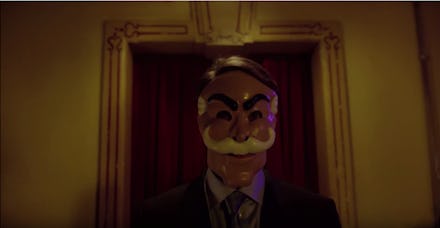'Mr. Robot' Finally Reveals Where the Monopoly Mask Came From — For Better or Worse

Mr. Robot's second season has kept a familiar theme in its precredits sequences: flashbacks. The two-hour premiere showed its audience Elliot and Tyrell Wellick perpetrating the fsociety hack; the third episode offered context for the hacktivist group's arcade headquarters, plus the origin of their tongue-in-cheek name (fun society plastered on the arcade building, with the 'u' and 'n' removed).
Now, we finally know where fsociety's iconic mask — a face that resembles the board game's Mr. Monopoly mascot — came from. Its creation is a telling sign for just how convoluted the series could continue to be under creator Sam Esmail.
The flashback brings a knock on Elliot's door, a nod to the final scene in the season one finale. Of course, it isn't that knock — we still have no idea who came to Elliot's apartment that night — but it was Darlene, who Elliot hasn't seen in a while. She's back in New York, and whatever dire situation she's in compels her to make a compulsive purchase: a knock-off Monopoly mask.
"Found it in the 99-cent shop in Chinatown," she tells him. "I didn't know they made a mask from that movie. Did you?"
That film, it turns out, is a 1984 horror flick that Elliot is able to torrent from his computer: The Careful Massacre of the Bourgeoisie. The premise is quite simple: A masked serial killer is knocking off some college-aged kids at a posh, daytime New Year's party. The blood is overdone and cheesy. But it was enough to draw some eagled-eyed viewers' attention on the Twitterverse — because the film doesn't exist.
Others might've done well to do a quick Google search.
The metafictional horror is yet another trick from Esmail, but it draws on the real horror of Elliot's psychological unraveling. He tells Darlene about how he got fired from his last job: He was paid to, essentially, hack a company to help improve their online security, but his overeagerness drew the ire of his co-workers. Over Memorial Day weekend, Elliot kept the employees late, and as payback, they locked him up in the server room. This is the first confirmed instance of Elliot's Mr. Robot persona coming out for an extended period of time.
The next thing Elliot remembers, he wakes up in the room and the servers have been destroyed. It was him — well, Mr. Robot — and he's sent to his psychiatrist, Krista, for the first time. But with Darlene's insistence, we also see Elliot succumbing to Mr. Robot in real-time, after he dons their father's old jacket and wears the Monopoly mask.
It's pretty terrifying; Elliot transitions from his typical, reserved behavior to a hyperactive, hyperparanoid person — the kind who would unload a scathing monologue on religion, like we saw in the previous episode. He talks about bringing down Evil Corp as a "Trojan Horse," turning society on its head with the hack to end all hacks.
However, Elliot also provides some meta-commentary for his own show. "The hard part would be after, during the fallout," Elliot says of the Evil Corp hack. "That's the key, the follow-through."
The fsociety hack has happened, and Mr. Robot's second season is dangerously flirting with a dreaded sophomore slump. The follow-through, post-hack future of the show needs a big payoff, and the first four hours of the second season have done little more than continue the internal struggle between Elliot and Mr. Robot. It's working so far — because of Darlene's and Angela's storylines, brilliant overall performances and memorable monologues — but Esmail could risk the patience of his viewers, eventually.
The biggest gripe, as noted by HitFix's Alan Sepinwall, is that the series inherently makes its audience question everything; whether what we're seeing is really happening. It's a natural occurrence after the show revealed Darlene as Elliot's sister, and Mr. Robot as the personification of his father. The suspicious circumstances of Elliot's monotonous routine in season two also have fans suspecting it's a faux reality.
But the origin of the Monopoly mask being built on a fictitious horror movie with a campy name is the kind of question that's going to send viewers online to find out if it was real or not. It's clever, but the fact that the audience is instinctively ready to do so for each minute detail takes away from focusing on the actual narrative. Moreover, some of the best moments from this season, like the reveal of fsociety's origins and the Monopoly mask, are flashbacks that predate season one.
Mr. Robot works because it bucks the trends of other television series and provides an incredibly unreliable narrator in Elliot — so we'll never get the full picture. However, it still needs to do what makes any show a success: Ultimately, it has to move the plot forward with more than just timely flashbacks.
Read more: